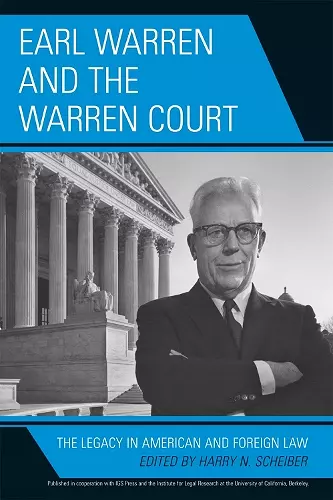Earl Warren and the Warren Court
The Legacy in American and Foreign Law
Format:Paperback
Publisher:Lexington Books
Published:27th Nov '06
Currently unavailable, and unfortunately no date known when it will be back
This paperback is available in another edition too:
- Hardback£105.00(9780739116340)

Earl Warren and the Warren Court comprises essays written by leading experts from the fields of law, history, and social science on the most important areas of the Warren Court's contributions in American law. In addition, Scheiber includes appraisals of the Warren Court's influence abroad, written by authorities of legal development in Europe, Latin America, Canada, and East Asia. This book offers a unique set of analyses that portray how innovations in American law generated by the Warren Court led to a reconsideration of law and the judicial role—and in many areas of the world, to transformations in judicial procedure and the advancement of substantive human rights. Also explored within these pages are the personal role of Earl Warren in the shaping of "Warren era" law and the ways in which his character and background influenced his role as Chief Justice.
Much print has been spilled about the Warren Court "revolution," but this collection of essays is very much worth reading. It compiles the wisdom of an unusually diverse and talented group of legal writers, and it provides unique perspectives on the impact of the Warren Court abroad. Earl Warren and the Warren Court is an important contribution to the literature on the modern Supreme Court of the United States. -- Stanley N. Katz, Princeton University
This is an unusually fine and unhackneyed collection of essays on the work of the United States Supreme Court during the Earl Warren years, and the significance of that work for society and for the legal order. The chapters on the influence of Warren and his court outside the United States are an unusual and fascinating feature of this collection. -- Lawrence M. Friedman, Marion Rice Kirkwood Professor of Law, Stanford Law School
These essays add up to a searching reappraisal of the Warren Court. While fully appreciating the great contributions of that Court to fair and equal treatment of America's minorities and pariahs, the authors also look with a clear and critical eye on theCourt's limitations and failures. They challenge the common view that the Warren Court was radically activist, showing that although the Court took the lead on many issues of civil rights and liberties, it worked alongside Congress and the executive andwas cautious in challenging strongly held public opinions, though often naïve in failing to foresee how hostile public reactions to its decisions would be. The most original and fascinating chapters look at the reception of the Warren Court's work in foreign countries and legal cultures. Some foreign lawyers saw the Warren Court as a model of what judges should not do, political rather than legal decision-making. But many took inspiration from the Court's work to embolden constitutional review, public-interest law, and the protection of human rights in their own countries. These essays are thoughtful, reflective, and often startlingly novel work of high quality. They are a both a fine introduction to the Warren Court and a fresh source of new insight -- Robert W. Gordon, Chancellor Kent Professor of Law and Legal History, Yale Law School
Recommended. * CHOICE *
The contributors to this collection take what has become in some ways a rather static discussion about the history of the Warren Court and open it up in illuminating, analytically powerful ways. * H-Net: Humanities and Social Science Reviews Online *
Almost 40 years after Chief Justice Earl Warren retired, the Court that bears his name remains influential. This volume grew from a 2004 conference at Warren's alma mater, the University of California, Berkley; it complements Jim Newton's biography of Warren,Justice for All (2006), and Ed Cray'sChief Justice: A Biography of Earl Warren (1997) by focusing less on Warren than on the Court that he led. Many legal heavy hitters, mostly law professors, contributed to the volume, which features an introduction, 13 chapters, and a brief afterword. Summing Up: Recommended for all readership levels. * CHOICE *
These essays add up to a searching reappraisal of the Warren Court. While fully appreciating the great contributions of that Court to fair and equal treatment of America's minorities and pariahs, the authors also look with a clear and critical eye on the Court's limitations and failures. They challenge the common view that the Warren Court was radically "activist", showing that although the Court took the lead on many issues of civil rights and liberties, it worked alongside Congress and the executive and was cautious in challenging strongly held public opinions, though often naïve in failing to foresee how hostile public reactions to its decisions would be. The most original and fascinating chapters look at the reception of the Warren Court's work in foreign countries and legal cultures. Some foreign lawyers saw the Warren Court as a model of what judges should not do, "political" rather than "legal" decision-making. But many took inspiration from the Court's work to embolden constitutional review, public-interest law, and the protection of human rights in their own countries. These essays are thoughtful, reflective, and often startlingly novel work of high quality. They are a both a fine introduction to the Warren Court and a fresh source of new insight for those who think they know the subject well. -- Robert W. Gordon, Chancellor Kent Professor of Law and Legal History, Yale Law School
ISBN: 9780739116357
Dimensions: 233mm x 154mm x 17mm
Weight: 553g
380 pages